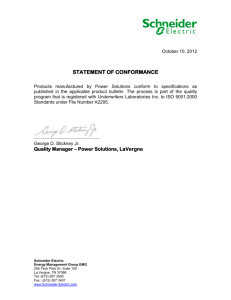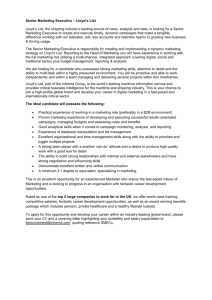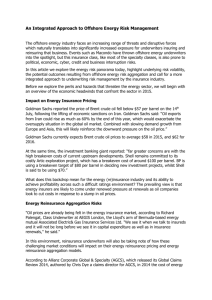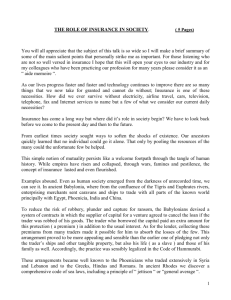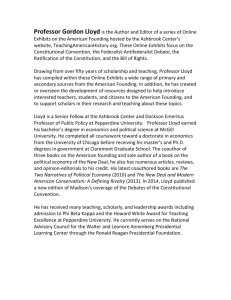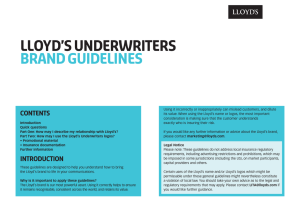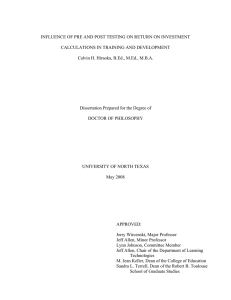Today's Lecture #25 The Insurance Institution
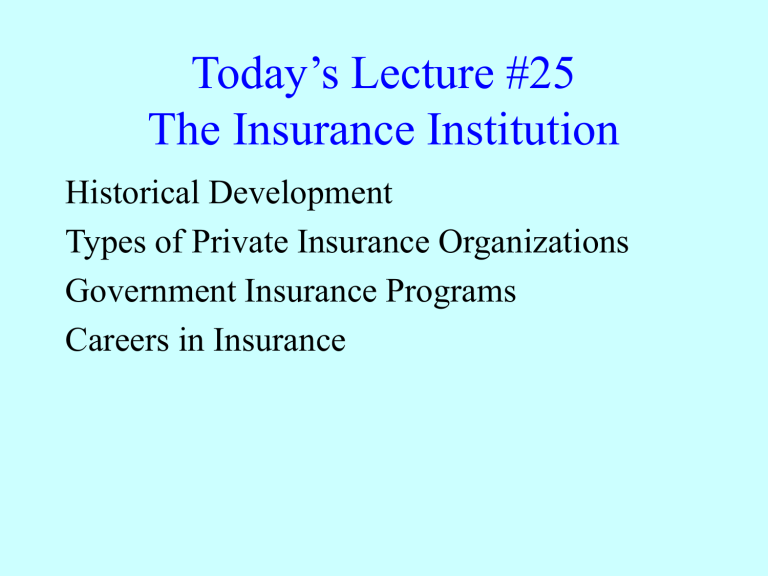
Today’s Lecture #25
The Insurance Institution
Historical Development
Types of Private Insurance Organizations
Government Insurance Programs
Careers in Insurance
Historical Development
Babylonian Merchants - Robbery
Code of Hammurabi - Adoption Annuity
Greek Shipping
Bottomry - covered vessel
Respondentia - covered cargo
Premium - risk charge included in interest
Historical Development
( Continued)
Lombard and Venetian Traders
14th Century
Polizza => policy written and folded document
Initial source of marine insurance in England was “Lombard Street”
British Chamber of Insurance - 1574
Risk-bearers (underwriters) met in coffeehouses
Edward Lloyd’s innovation
Life Insurance
June 18, 1536 Group of Marine Underwriters from the Old Drury Ale House in London
Insured the Life of William Gibbons
12 month policy for $2000
15 underwriters split $80 premium
William Gibbons died May 29, 1537
Underwriters contested the claim on the basis that coverage was for 12 lunar months
You Be the Judge in the
William Gibbons Case
A) The policy should be void. The underwriters should return the premium to the widow.
B) The underwriters should have to pay the claim in full.
C) The underwriters should not have to pay the claim at all.
D) The claim should be settled with a partial payment since the language was unclear.
E) None of the above
Fire Insurance
September 2, 1666 -
London Fire
Dr. Nicholas Barbon established the first fire insurer in 1667 - Fire
Office
Fire Insurance in America
Great Fires in America
Boston - 1630, 1653
Philadelphia - 1730
Charleston, SC - 1740
New York - 1835
Chicago - 1871
2/3s of city
68 of 202 insurers went bankrupt
San Francisco - 1906
What Caused the 1871 Chicago Fire?
A)
Mrs. O’Leary’s cow kicked over a lantern
B)
Mike O’Leary was playing with matches
C)
A blacksmith’s forge overheated
D)
A drunk dropped a match in the O’Leary barn
E) None of the above
Fire Insurance in America
(Continued)
Union Fire Company of Philadelphia - 1730
Formed by Ben Franklin
Purpose was fighting fires
Friendly Society of Charleston - 1735
One of first fire insurers
Bankrupt in 1740
Philadelphia Contributorship for the Insurance of Houses from Loss by Fire - 1752
First mutual
Underwriting policy - no trees near house
Structure of the Insurance Industry
Monoline policies
Multiple-line coverage
Mergers
Full service financial organizations
Types of Private Insurance
Organizations
Stock
Mutual
Reciprocal
Lloyd’s of London
Lloyds Associations
Insurance Exchanges
Banks
Lloyd’s of London
Developed from underwriters first operating out of Edward Lloyd’s coffeehouse
Association of individuals who write insurance for their own account
Underwriting members (names) accept risk and have unlimited liability
Names are formed into syndicates that accept risk through brokers
Lloyd’s of London
Growth in membership
1953 3,400
1978 10,000
1989 34,000
1994 17,500
What happened to all those members from 1989?
Losses in 1988-1992 of $14 billion
1,500 members went bankrupt
Now accepting corporate capital with limited liability
Active Members in Lloyd’s
1995-2006 http://www.lloyds.com/Lloyds_Market/Capacity/Members.htm
Lessons from Lloyd’s of London
• Insurance is a very risky business
• You must know what risks you are accepting
• A long history is no guarantee for the future
• If you or your company does not understand a risk, don’t accept it
Government Insurance Programs
State
Unemployment insurance
Guaranty funds
Workers’ compensation
Medical malpractice Joint Underwriting Associations
Beach and windstorm insurance plans
Maryland auto plan
Government Insurance Programs
(Continued)
Federal
Social Security
Federal Deposit Insurance Corporation
National Flood Insurance Program
Pension Benefit Guaranty Corporation
Careers in Insurance
Specialized
Actuary
Underwriter
Claims adjuster
Marketing
Investment
Legal
General
Management
Accounting
Human resources
Computer systems
